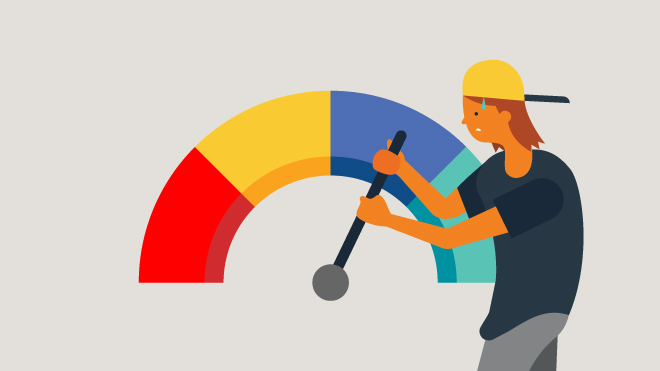
Things To Know About Credit Scores
Economic conditions have been tough the past couple of years, but there is one bit of good news: Credit scores have improved dramatically. Learn how you can get in on the trend.
Many people are emerging from the challenges of the pandemic on firm financial ground. How do we know? Because one of the biggest measures of financial health — the credit score — sky rocketed to record levels in 2020, and held firm through 2022, according to Experian.
Learn how you can drive your score up, too, and keep it as high as possible, with tips from Stacey Black, BECU's lead financial educator.
How Credit Scores Are Used
From stepping on the bathroom scale to analyzing blood samples, we have lots of ways to measure our physical health, but what about our financial health?
One measure is your credit score — a three-digit number that plays a big role in whether you qualify for a home mortgage or a loan for a new car. If you do qualify, lenders will use your score to determine what interest rate you'll pay.
Credit scores also factor into landlords' decisions about whether to rent an apartment to you.
"Landlords look at credit history to gauge your ability to pay your bills on time," Black explained. "Credit scores are also used to determine how much of a deposit you need to pay for things like cell phone plans and utilities. The higher the score, the lower the deposit amount."
Credit scores also play an integral part in your future financial health. The bottom line: The higher your credit score, the less money you may end up paying.
"Did you know that employers often pull credit or do financial checks on job candidates? It's important to build, defend and take advantage of great credit, regardless of your age or where you are financially," Black said.
Credit Scores Vary Across Credit Bureaus
FICO is a credit scoring model invented by Fair Isaac Corp. more than 25 years ago. The three main credit bureaus (Experian, TransUnion and Equifax) use FICO, but it is unlikely that your FICO score will be the same at each one.
"This can be very confusing for people," Black said, "but each company maintains its own credit report information."
For example, if you apply for a credit card, the lender will likely pull your credit report but may not pull from all three credit bureaus. New negative information (like missed payments, for example) can also be added at different times, which can cause your scores to vary slightly across bureaus.
"Keep in mind, there are different scoring models used by popular online sites and apps that may show a different score," Black explained. "That said, FICO is a model used by many lenders and the one you should pay the most attention to."
5 Factors That Raise Your Score
FICO scores range between 300 and 850. The number is intended to suggest the likelihood someone can repay a lender. According to Black, anything above 700 is considered good or very good.
There are five main factors that make up your credit score:
- 35% — Payment history
- 30% — Debt relative to credit
- 15% — Age of open credit accounts
- 10% — Recent credit applications
- 10% — Having more than one type of credit
Understanding credit scores can be challenging, but there are things you can do to improve yours. Just know it won't happen over night.
"When I was in high school, I got into trouble with credit cards," Black said. "I didn't realize the huge impact they would have on my financial future. We can ruin our credit very quickly, but it can take a long time to clean it up."
About 32% of Americans had paid bills late in the last six months, and 64% said they have paid a bill late previously, according to a LendingTree survey. Not paying bills on time can have a significant impact on your credit score.
"Paying your credit accounts on time is the most important thing you can do in order to maintain and improve your credit score," Black said.
It can also be tempting to sign up for new cards to gain rewards and discounts, but doing so can actually ding your credit score.
"I had someone in a class who couldn't figure out why their credit score had dropped," Black recalled. "I discovered that they applied for several credit cards, which had lowered their score with each application. We discussed the importance of not applying for credit cards just to get a discount."
On the flip side, it's best to keep unused credit cards open so that you benefit from a longer average credit history and a larger amount of available credit.
Check Credit Scores and Reports Regularly
It's important to stay on top of your credit reports to make sure they're accurate. That way, if there are errors or if someone opens a line of credit in your name, you can catch it and report it right away.
"If you haven't seen your credit reports recently, I suggest you pull all three now at annualcreditreport.com," recommended Black. "If you've seen your reports within the last year, you might want to consider spreading it out and pulling one around every four months so you can track any changes."
Related Content
FICO is a registered trademark of Fair Isaac Corporation in the United States and other countries.
This is for informational purposes only and is not intended to provide legal or tax advice regarding your situation. For legal or tax advice, please consult your attorney and/or accountant.


